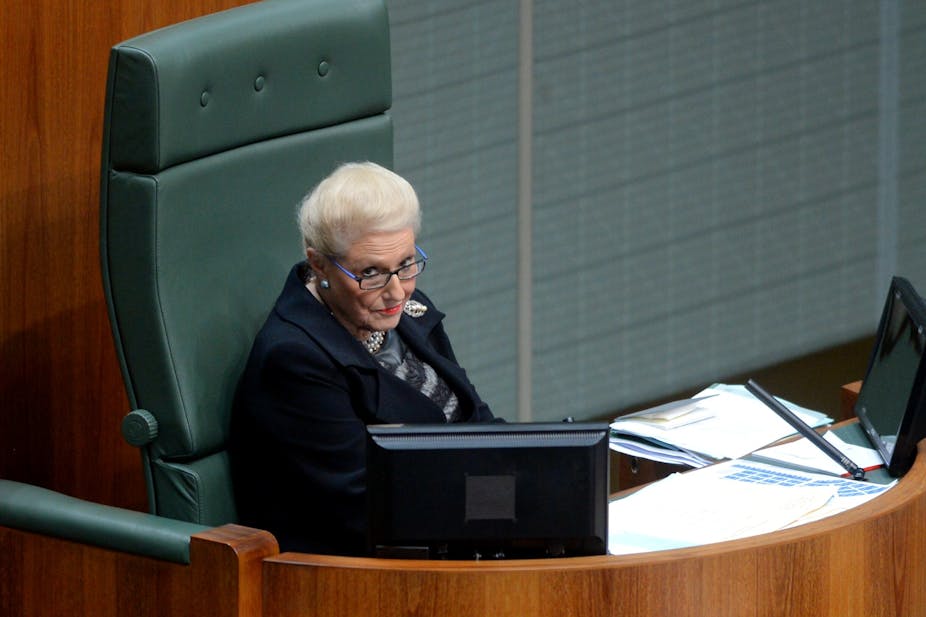Seven Speakers of the British House of Commons were executed by beheading between 1394 and 1535. While Bronwyn Bishop, the current Speaker of Australia’s House of Representatives, is unlikely to face this fate, she faces an uphill battle to gain the respect of political observers and opposition MPs alike.
After the dramas of the 43rd parliament, prime minister Tony Abbott would have expected that his government – with a secure majority – would have a quieter time in parliament. But the controversy about the performance of Bishop has provided a distraction.
Last Thursday, the Labor Party unsuccessfully moved a vote of no confidence in the speaker after Bishop expelled Labor frontbencher Mark Dreyfus for 24 hours. It was the first time since 1949 that such a motion had been moved. It came amidst ongoing criticism of Bishop’s performance by Labor MPs, who argue that she has displayed partisanship towards the government.
Bishop has so far thrown 99 MPs out of the chamber since taking the chair last November: all of whom belonged to the opposition. Political commentators such as Dennis Shanahan and Peter van Onselen have also been critical of Bishop’s performance, while she has also continued to attend Coalition partyroom meetings, unlike the two Labor speakers who served during the last parliament, Harry Jenkins and Anna Burke.
Bishop’s partisanship reflects an approach to politics that was once associated with the political left. In 1891, NSW Labor MP George Black declared that the role of Labor was not just to change governments but to make and unmake social conditions. Labor saw the role of parliament as to directly reflect the popular will for social change.
It was the conservatives who venerated the mythology of parliament. They looked back to the traditions of British parliamentarianism formed during the 18th century. The ideal of the “independent speakership” dates from this period. Edmund Burke, Abbott’s favourite philosopher, argued that members of parliament were not delegates of their electorate but trustees of the common good.
This romantic idea of parliamentary independence reflected the unchallenged hold of the Whig aristocracy on politics. As German philosopher Carl Schmitt argued, classical parliamentarianism is about conflicts of opinion with a unified ruling elite. But the rituals of contemporary parliament are ill-suited to the management of the conflicts of interest that emerged from the 19th century as subordinate classes entered politics.
The British model of an independent speaker has survived largely because in a parliament of 650 MPs, either party can afford to surrender a single vote. But this has not always been the case: in March 1979, the Labour government lost a vote of confidence by one vote. The government would have survived if the speaker, a member of the Labour Party, had voted with the government. Conservative leader Margaret Thatcher came to power at the ensuing election.
As Australian parliaments are much smaller than the British House of Commons, parties are much more reluctant to surrender a single vote.
Australian conservatives well into the 20th century upheld this rhetoric of parliamentary independence. At times, Labor has been able to take advantage of this: in 1911 and between 1919 and 1922, Labor governments held office in New South Wales because they were able to persuade a conservative MP to serve as speaker. The Gillard government’s recruitment of Peter Slipper as speaker was perhaps inspired by this example.

In 1929, the federal government of conservative prime minister Stanley Bruce fell after rebel backbenchers voted against the proposed abolition of the Commonwealth industrial arbitration system. The then-speaker, Littleton Groom, refused to vote with the government.
The conservative Sydney Morning Herald newspaper, usually a stickler for British tradition, complained that Groom should have voted with the government. Voters in his electorate agreed and evicted him from parliament at the next election.
These days of conservative dissidence are long gone. In 1999, the minority Victorian Labor government failed to persuade a member of the National Party to serve as speaker.
Coalition and Labor speakers face competing incentives. They remain in office on the privilege of their party but the successful performance of their duties requires a modicum of support or at least toleration by the opposition. Votes on the floor of the House of Representatives are usually entirely predictable, but the ability of an MP to perform effectively on the floor as a minister has become a major indicator of a political success. A chaotic and disorganised parliament provides bad image for a government.
In the 20th century, it was Labor speakers who often came under criticism as too sympathetic to “their” government. Solomon Rosevear, Labor’s speaker from 1943 to 1949, was widely criticised as biased and inflexible. For him, the speakership was a consolation prize for not securing a ministry.
Jim Cope, speaker under Gough Whitlam’s Labor government from 1972 to 1975, faced the opposite problem. He resigned the speakership in 1975 after the Labor majority in the House of Representatives rejected his suspension of a Labor minister.
Under Bob Hawke’s consensual style, less pressure was placed on the speaker and respected parliamentary veterans occupied the chair. But Paul Keating’s ascension to the prime ministership in 1991 returned the focus of political conflict back to parliament. From 1993 to 1996, the youthful Stephen Martin occupied the speaker’s chair.
For Martin, the speakership was a prize he received largely as a consolation for not securing a ministry. The Coalition complained that Martin placed too little check on what they regarded as Keating’s unparliamentary behaviour.
The lesson here is that those who receive the speakership as a consolation prize such as Rosevear, Martin and Bishop are less likely to inspire the respect of the opposition. As befits a conservative, Abbott places a high value on loyalty and identity, but he may have reason to regret his patronage of Bishop.

